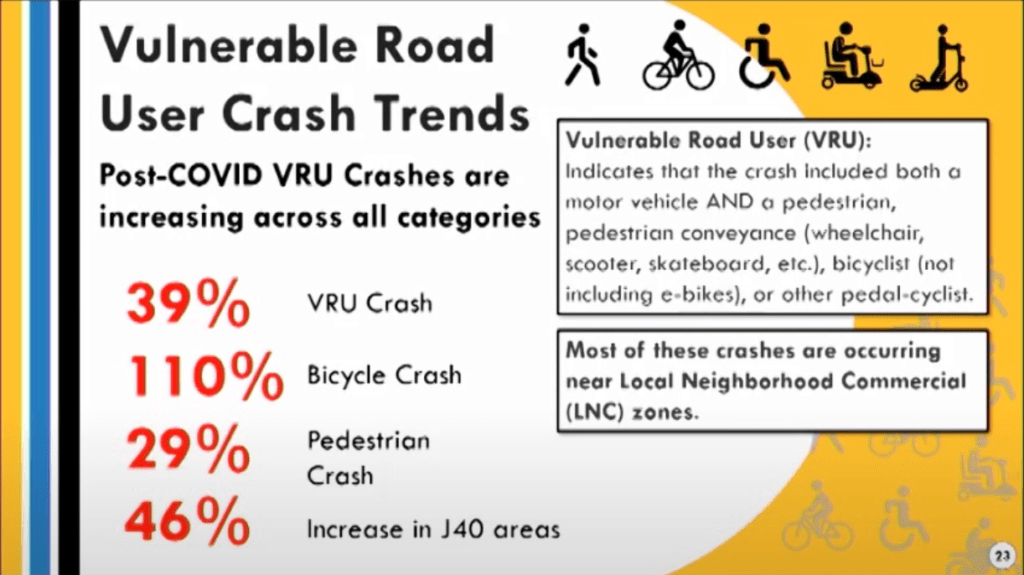
PPT Members Organize for Transit Streets with the Renewed Complete Streets Advisory Group
PPT members have been organizing for accessible and safe transit streets for several years now, beginning with the Pittsburgh mayoral race of 2021, and with specific policy goals outlined in the Pittsburgh 100 Day Transit Platform. Last fall, PPT won one of our central demands, which was to restart the City’s Complete Streets Advisory Group, as a formal space for members of the transit community and disability community to lift up equitable pedestrian and transit access needs.
The context: The City of Pittsburgh committed to the creation of the Complete Streets Advisory Group (CSAG) with the passage of the Complete Streets Policy in 2016. For several years, there was an active CSAG with members of the public and disability community, and which developed the City’s critical Pedestrian Safety Action Plan, but this group lapsed in 2019. One critical obligation that the City’s Department of Mobility and Infrastructure (DOMI) never fulfilled during this time was reporting to Pittsburgh City Council on a biannual basis on the State of Mobility in the City, and sharing the City’s progress in building safe and accessible pedestrian, transit and cycling infrastructure.
PPT’s role in CSAG: PPT staff organizer Nicole Gallagher and PPT members Gabriel McMorland, Alisa Grishman, Dean Mougianis, Hannah Dean, Bernadette Mosey and Gina Anderson have been invited to join the Complete Streets Advisory Group, and over the last six months, have been supporting staff at DOMI to focus more on public transit’s role in moving the residents of our City. These PPT members have also been regularly meeting with other members of the PPT organizing committee to identify opportunities for more dignified, safe, and accessible street infrastructure like sidewalks, bus shelters, and bus priority lanes in our City.
Organizing for equitable transit-improving infrastructure is one of the five major campaign buckets in PPT’s 2024 Strategic Plan. We recently wrapped up our bus shelter audits, but if organizing for equitable infrastructure like expanded and connected sidewalks and more transit shelters is important to you, then join PPT’s Organizing Committee to help inform our work at the Complete Streets Advisory Group!
One of the first tasks that the restarted Complete Streets Advisory Group was charged with was to review the DOMI’s outstanding Biennial Report on the State of Mobility in the City of Pittsburgh, in advance of its presentation to City Council. You can watch DOMI’s presentation and read the report here.
We applaud the City’s Department of Mobility and Infrastructure for compiling important data around the critical roles that transit, walking and biking plays for residents of this City, and laying out the investments in pedestrian, transit and bicycle infrastructure that have been made in the last several years. This transparency is welcome and helpful for residents to both understand how these resources are being expended, what barriers exist to more equitable infrastructure, and where more attention should be paid.
The data revealed the challenges that lie ahead for the City of Pittsburgh. One disheartening finding in The Crash Trend Analysis revealed that transit riders are some of the most vulnerable road users. However, we are encouraged to see that the City’s traffic calming projects are working to reduce these tragic fatalities.

What PPT continues to advocate for
We continue to encourage the City of Pittsburgh to invest more in transit and sidewalks, so that the resources of the City are allocated in balance with the use of each mode. Two important first steps that PPT put forward in the Pittsburgh 100 Day Transit Platform, and which were lifted up in Mayor Gainey’s Transition Plan (p. 98 and p.100) would be to develop a Pittsburgh Transit Plan (like that of the City of Philadelphia), to relocate the 20+ Bus Shelters that are currently located at defunct transit stops in the City, and to create a Sidewalk Fund that developers would pay into, which could be used to address critical pedestrian access gaps.
Join us in organizing for the City of Pittsburgh to be a Transit City, with all the equitable, safe, accessible infrastructure that we deserve! Connected sidewalks and quality transit reduces congestion, improves air quality, allows for denser, more amenity-rich neighborhoods, giving all of our communities the opportunity to thrive.